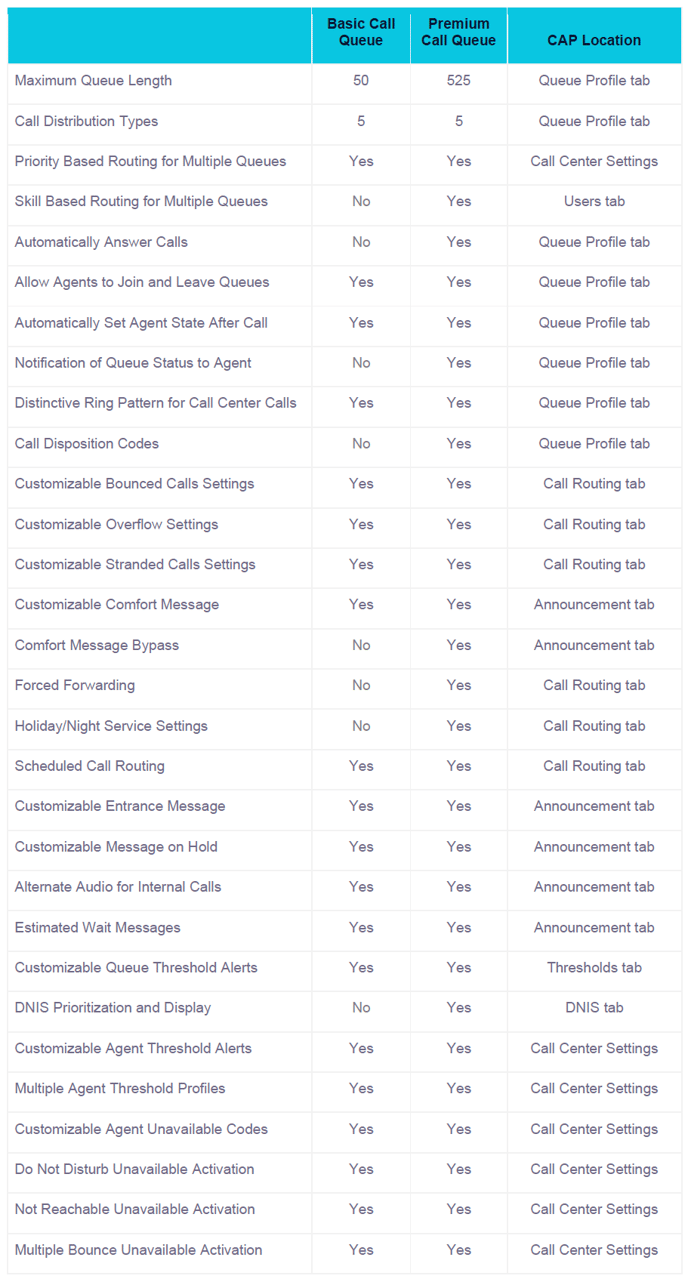Comparison between Basic and Premium call centers
The Voyant Hosted Contact Center service offers two types of queues. With the appropriate user license, basic and premium call queue can be set up in the Customer Administration Portal in the Call Center section.
● In order to have access to build call queues in the Customer Administration Portal, at least one seat must have a user with a license that allows agent privileges.
● A seat with a user with agent privileges can be assigned to any number of call queues. An advanced license can be assigned to both basic and advanced queues, while a basic license may only be assigned to basic queues.
● Users who are on multiple call queues can have those queues prioritized by wait time, queue priority, or skill level (advanced queue only for skill routing).
● The announcement services available to call queues are above and beyond what is typical for Music on Hold at the enterprise level.

Queue Feature Details
Allow Agents to Join and Leave Queues: When turned ON this feature will allow the agent’s desktop phone and the nCommand/Voyant Connect app to log in and out of the call center queues of which the agent is a member.
Alternate Audio for Internal Calls: The music on hold can be a different set of files when internal callers are on hold.
Automatically Answer Calls: (Premium only) When activated, the incoming call automatically is answered by an agent’s endpoint after a set number of rings.
Automatically Set Agent State After Call: Agents can automatically enter a wrap-up or unavailable code for a set period of time after each call terminates.
Call Disposition Codes: (Premium only) A disposition code can be entered by an agent for the current call that is still ongoing or for the last call that has just ended. This is useful for reporting on call types.
Call Distribution Types: This setting defines how the ACD algorithm will search through the list of agents to find the next one to present the call.
Comfort Message Bypass: (Premium only) Allows the call queue to skip a planned comfort message if given parameters are set.
Customizable Agent Unavailable Codes: Unavailable codes place the agent in a state where the ACD algorithm still recognizes them but will not route calls until they become available again. Administrators can define specific purpose codes.
Customizable Bounced Calls Settings: Administrators can define the conditions that make a bounced call, such as the number of rings and how long a call can be on hold before it automatically bounces.
Customizable Messages: Administrators can upload custom .wav files for the various messages that are played to callers.
Customizable Overflow Settings: Administrators can define the conditions that determine overflows, such as queue length, time in queue, custom overflow message, and overflow path.
Customizable Queue Threshold Alerts: Administrators can define the metrics that will trigger yellow and red alerts. These alerts appear in the Supervisor Console and can be delivered via email to up to nine addresses.
Customizable Stranded Calls Settings: Calls are stranded when they reach the queue and no agents are logged in. The action these calls take can be defined by an Administrator.
Distinctive Ring Pattern for Call Center Calls: A choice from four options can be chosen to be sent from the system to the agent so a distinctive ring plays depending on the call center.
DNIS Prioritization and Display: (Premium only) The premium call center can display the inbound number dialed to the agent, and it can use this inbound number to determine priority for the algorithm as it chooses an available agent.
Do Not Disturb Unavailable Activation: A given unavailable code can be triggered by the agent going into Do Not Disturb on the device.
Estimated Wait Messages: Vocalized alerts can be played for callers. Administrators can set the interval and the type of message.
Forced Forwarding: (Premium only) This feature can temporarily forward incoming calls.
Holiday/Night Service Settings: (Premium only) Administrators can set call routing in the event of night and holiday service.
Minimum Queue Length: The number of calls that can be handled by the ACD at any given time. Calls on hold + calls being handled must not exceed the set Queue Length or it will overflow.
Multiple Agent Threshold Profiles: agent thresholds can be set for different types of agents.
Multiple Bounce Unavailable Activation: Agent unavailability can be triggered by the agent bouncing calls a given number of times.
Notification of Queue Status to Agent: (Premium only) The endpoint (device or soft phone app) will give the agent status of the queue (calls in queue and queue length) at the beginning of every incoming call.
Not Reachable Unavailable Activation: A given unavailable code can be triggered by the agent being not reachable.
Priority Based Routing for Multiple Queues: This is a call-assignment strategy used to assign incoming calls to the most urgent queue, instead of simply choosing the next available agent.
Scheduled Call Routing: Calls can be routed away from the call center during set scheduled intervals.
Skill Based Routing for Multiple Queues: (Premium only) This is a call-assignment strategy used to assign incoming calls to the most suitable agent, instead of simply choosing the next available agent.
